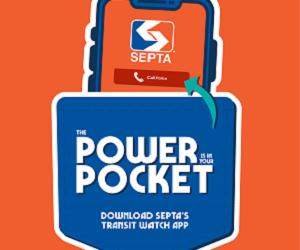
A Story With Heart
March 29, 2018

This story was written by Heather Redfern, SEPTA Public Information Manager, and was published on septa.org on February 15, 2017.
Donald Peyton has been a SEPTA bus operator for two years. But, you won't just see Peyton inside of a bus - you will see him on the outside too. The reason why his image now appears on advertisements for Crozier-Keystone Health System is what drives this miraculous story with heart.
After returning home from his overnight shift early in the morning of January 8, 2016, Peyton took to his normal routine - walking the dog, sitting in a chair in his bedroom, watching the morning news before his wife, Lynette, got up and left for work.
"All of a sudden, I felt tearing from the center of my chest down to my right ankle." Struggling for breath, Peyton called out for Lynette to dial 9-1-1. Somehow, he managed to get out of his bedroom and wait for the ambulance outside of his house. "I knew I was going to die, that I was down to my last few minutes," he said. "I was not going to die inside my house."
Paramedics quickly arrived at Peyton's house, transporting him to Springfield Hospital. Peyton was diagnosed with a dissecting thoracic aortic aneurysm, which is characterized by a bulge in the aorta, the largest artery of the body. A ruptured aneurysm can often be fatal, due to internal bleeding. "The medical staff was amazed that I was alive, let alone had made it to the hospital," Peyton said. "Many people die within minutes of a rupture."
Peyton was stabilized at Springfield and transferred to Crozer-Chester Medical Center, where he met the man he credits with saving his life, Charles M. Geller, M.D., chief of Cardiothoracic Surgery for Crozer-Keystone. Geller and his team performed an eight-hour surgical procedure, cooling Peyton's body to a very cold temperature, draining it all of his blood while preserving brain function and replacing the damaged part of his aorta with a Dacron tube. It's the only medical procedure he's had to have as a result of the rupture.
Peyton spent one week in the hospital and was back to work in less than four months. He said, "I had to be cleared to return to my job, by SEPTA's doctor, who was stunned that I was alive and ready to get back to work."
The story of Peyton's survival and recovery was so impressive that Crozier-Keystone asked him to appear in marketing materials for its cardiovascular care. He filmed a video and took some photos, but had no idea he would be featured on the buses he drives for SEPTA. "My daughter's friend saw me on the bus and sent photos," Peyton said. "I was shocked."
Peyton recently shared his story with Philadelphia's KYW-TV. "I was in good health when this happened. I had lost 25 pounds and worked out with U.S. Marines," he said. "I didn't have any warning signs for a heart issue, but a lot of people - especially men - do and they choose to ignore them. You have to pay attention to your body."
To see Peyton's video for Crozier-Keystone, click here. To view the CBSPhilly story, click here.



